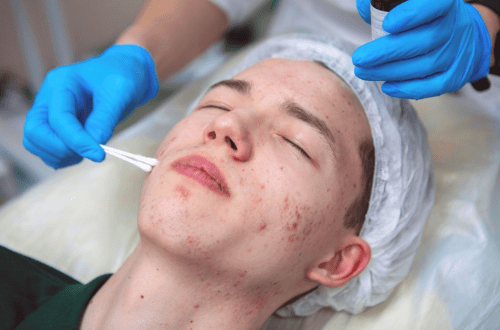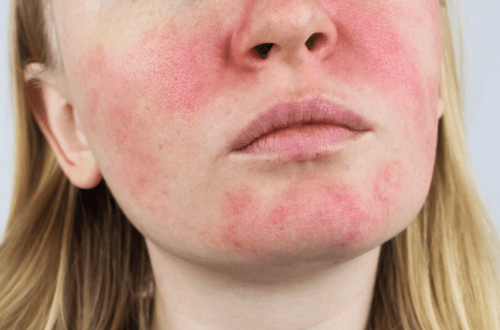10 Clinical Trials for Acne Research
Acne vulgaris, a highly prevalent chronic inflammatory skin condition with a significant impact on quality of life, is one of the top causes of non-fatal disease burden globally. Hidradenitis suppurativa (HS), or acne inversa, is a chronic, disabling, recurrent, and debilitating inflammatory disease with a high unmet medical need. An improved understanding of acne pathophysiology has enabled the development of innovative clinical trials and novel therapeutic modalities. Currently, interventions include topical medications, systemic therapies, e.g., repeated and/or rotational courses of systemic antibiotics, retinoids, and hormonal therapies, and various surgical procedures.
Read on to discover ongoing and recently completed clinical trials on novel therapeutics for acne.
Management of Acne
The management of acne vulgaris has evolved with an improved understanding of its pathophysiology (particularly the role of C. acnes in stimulating inflammatory responses and cytokine production) and the development of novel therapeutics. Future treatment strategies focus on immunity induction, wound healing mechanisms, innovative delivery systems, combination therapies, and sebocyte differentiation processes. Non-pharmacological interventions include laser and light therapies, chemical peels, and photodynamic therapy, which offer promising interventions.
Hidradenitis suppurativa (HS), or acne inversa, is a chronic disabling and debilitating inflammatory disease with a high unmet medical need. Over time, chronic uncontrolled inflammation results in irreversible tissue destruction and scarring. Treatment options include topical medications; systemic therapies, including repeated and/or rotational courses of systemic antibiotics, retinoids, and hormonal therapies; and various surgical procedures.
1. mRNA Vaccine
Starting in April 2024 and currently recruiting a Phase I/II, randomized, placebo-controlled, multi-arm, dose-finding study (NCT06316297) aims to evaluate the safety, efficacy, and immunogenicity of an acne mRNA vaccine candidate in adults (18 – 45 years old) with moderate to severe acne. The purpose of this first-in-human (FIH) trial is to evaluate one or two intramuscular injections of the acne mRNA vaccine candidate at three dose levels in target participants in the U.S. The study aims to assess the safety profile and efficacy of the vaccine candidate, select the dose for further clinical development steps, and describe the vaccine’s immunogenicity profile. The estimated study completion date is December 23, 2027.
2. Self-Administered Intralesional Injections
An interventional study (NCT06186596) assessing patient self-administered intralesional injections of triamcinolone for acne vulgaris began in 2023 in the U.S. and is currently recruiting (at the time of this article, June 2024). The study aims to test the safety of intralesional injections of triamcinolone self-administered into acne lesions via an injection assistance device. The researchers seek to answer the questions on the safety of the injection assistance device and the efficacy of the delivery of triamcinolone to acne lesions via the injection assistance device. In this open-label, prospective, single-arm study, participants will self-administer low-dose triamcinolone into acne lesions and track lesion response using photos and surveys for 14 days following the injection. Efficacy assessments will be conducted remotely by the investigator. Participants will conduct lesion pain assessments and satisfaction assessments during remote check-ins.
3. Secukinumab
Available treatment options for HS are minimal and show variable outcomes. In October 2023, the U.S. Food and Drug Administration (FDA) approved secukinumab for moderate-severe HS. A prospective monocentric study was designed to assess the safety and efficacy of secukinumab in HS patients in a real-life setting. Study results indicate that secukinumab in patients with severe HS who failed adalimumab may be a safe and effective therapeutic weapon.
Separately, two identical, multicenter, randomized, placebo-controlled, double-blind Phase III trials were conducted to assess the efficacy of secukinumab in patients with moderate-to-severe HS. Conducted in 219 primary sites in 40 countries, the study found that when given every two weeks, secukinumab was clinically effective at improving signs and symptoms of HS, with a favorable safety profile and sustained response of up to 52 weeks of treatment.
4. IDP-126
In 2023, the FDA approved its first fixed-dose triple-combination gel, IDP-126 gel (containing clindamycin 1.2%, adapalene 0.15%, and benzoyl peroxide 3.1%) for treating acne vulgaris. The New Drug Application (NDA) for IDP-126 was based on data from two Phase III randomized controlled and double-blinded trials (NCT04214639; NCT04214652) that assessed the efficacy of the gel in patients aged nine and above with moderate-to-severe acne over 12 weeks. The proportion of patients treated with IDP-126 achieving clear or almost clear skin was virtually half (49.6%) compared to 24.9% for patients treated with a vehicle gel in the first of the two Phase III trials and 50.5% vs. 20.5% for the second Phase III trial. A comparison of percent change from baseline in inflammatory lesions revealed 75.7% of patients receiving IDP-126 vs. 59.6% of the comparator in the first Phase III study and 80.1% vs. 56.2% for the second Phase III study. Researchers also noted a reduction in non-inflammatory lesions.
5. Heat Shock Protein 90 Inhibitor RGRN-305
HS is a painful immune-mediated disorder with limited treatment options. A Phase I study in Denmark (NCT05286567) assessed the safety and efficacy of the heat shock protein 90 inhibitor RGRN-305 as a novel mechanism of action in treating moderate to severe HS. A parallel-design, double-blind, proof-of-concept, placebo-controlled randomized clinical trial randomly assigned patients to receive oral RGRN-305 or matching placebo once daily for 16 weeks. The primary efficacy endpoint (the percentage of patients achieving HS Clinical Response 50 (HiSCR-50) at week 16 was achieved by a higher percentage in the treatment group (60%) than in the placebo group (20%). Trial findings suggest that heat shock protein 90 inhibition by RGRN-305 offers a novel mechanism of action in treating HS, warranting further research in larger trials.
Currently, there is no FDA-approved treatment in Hsp90 inhibitors category, but there are multiple ongoing clinical trials.
6. Nanoparticle
An interventional study (which has yet to start recruiting) (NCT06175819) aims to manufacture a honey-loaded nano-formulation using natural materials with anti-inflammatory and broad-spectrum antibacterial activity as a potent tissue-healing remedy. In the clinical trial, a manuka honey nano-formulation will be fabricated for topical delivery.
Separately, researchers in Australia transformed the topical antibacterial medication narasin, which has anti-acne effects, into a nanoparticle gel with potential applications for acne treatment. They used a non-ionic bifunctional amphiphilic copolymer drug-delivery system to solubilize poorly aqueous substances like narasin into soluble solutions. The resultant narasin-micelle solution was integrated into a gel formation. The study found that narasin exhibits promising activity against antimicrobial-resistant strains of C. acnes and that nano micelles enable targeted drug delivery to lipophilic skin layers. The researchers concluded that narasin is potentially an effective anti-acne therapeutic and that nano-micelles ensure safe targeted topical delivery.
7. ASC40 (Denifanstat)
A multicenter, randomized, double-blind, placebo-controlled Phase III study (NCT06192264) is recruiting participants with moderate to severe acne vulgaris to assess the safety and efficacy of ASC40 (Denifanstat) compared to a placebo. The mechanisms of ASC40, an oral, selective small molecule inhibitor of fatty acid synthase (FASN), include direct inhibition of facial sebum production and inhibition of inflammation. The estimated primary completion date is December 15, 2024, while the estimated study completion date is March 9, 2025.
8. Microneedling
Treatment of acne vulgaris relies on oral antibiotics, which may be harmful to intestinal flora, or topical antibiotic ointments, which may be impeded by the skin’s barrier effect. An alternative, microneedling, is a novel localized drug delivery system that noninvasively breaks through the stratum corneum barrier and improves the transdermal absorption of drugs14. In recent years, microneedles have been extensively studied due to their special morphology and excellent performance.
A pilot clinical study sought to determine the safety and efficacy of microneedling as a treatment for acne vulgaris without disrupting critical skin structure or the skin microbiome. The study found that microneedling effectively reduced acne lesions and did not cause post-treatment complications. In another study, Zhang et al. (2024) demonstrated that a soluble microneedle patch can effectively deliver antimicrobial drugs to lesions and treat acne vulgaris in situ.
9. Spironolactone vs Doxycycline
An interventional clinical trial (NCT04582383) aims to evaluate the comparative effectiveness of spironolactone (hormonal therapy) vs. doxycycline hyclate (antibiotic) for women with acne. Still recruiting, the estimated study completion date is in 202616. A similar study in France presented results of its multicentre, controlled, randomized, double-blind prospective, and parallel study, which aimed to assess the efficacy of spironolactone vs. doxycycline in adult female acne. The investigators found that spironolactone was 1.37- and 2.87 times more successful than doxycycline at the four and 6-month time points. Further, spironolactone was very well tolerated, and patients’ quality of life in the spironolactone arm was better at months 4 and 6.
10. Natural, Topical DMT310
To address the common clinical challenge of poor patient adherence, DMT310 is a natural, topical product with a once-weekly application schedule. A Phase IIb randomized, double-blind, placebo-controlled trial evaluated the safety, tolerability, and efficacy of DMT310 in treating moderate-to-severe acne. The study found that DMT310 significantly reduced inflammatory and non-inflammatory lesions.
As of the publication of this article, a Phase III study of tolerability, safety, and efficacy of DMT310 in patients with acne vulgaris is ongoing, still recruiting, and expected to be completed in 2025.
Dermatology Clinical Research
Current trends in dermatology research include the application of telemedicine, artificial intelligence (AI), nanotechnology, wearable tech, and patient-centric approaches, as well as a focus on targeted therapies, microbiome research, stem cell research, genetic research, and personalized medicine.
TFS: Your Dermatology Research Partner
At TFS HealthScience, the Dermatology, Immunology, and Inflammatory Disease team manages clinical development Phases I-IV, RWE, and patient recruitment in multiple indications. We partner with you to develop a regulatory and operational strategy tailored to your specific trial’s requirements, then deliver all your clinical program’s scientific and medical aspects to help ensure market success. To date, we have delivered nearly 250 studies in over 20 countries. Contact a team member today to learn how we can help you with your next clinical trial!
Connect with Us
Contact us today to discover how TFS can be your strategic CRO partner in clinical development.


